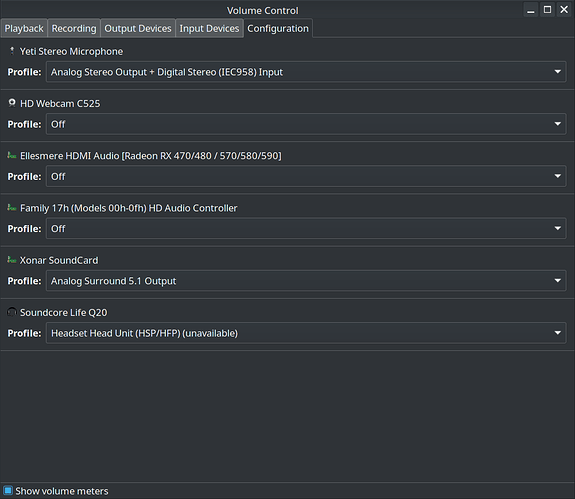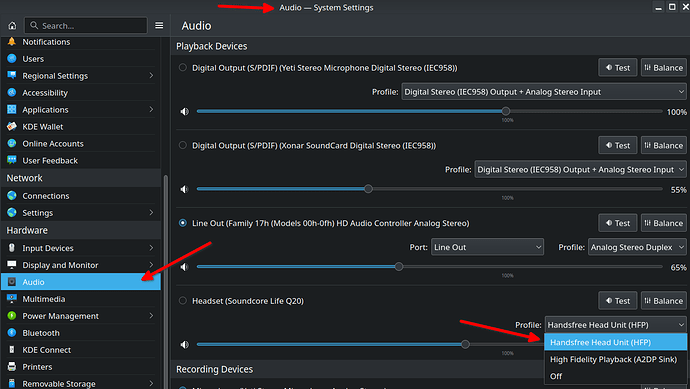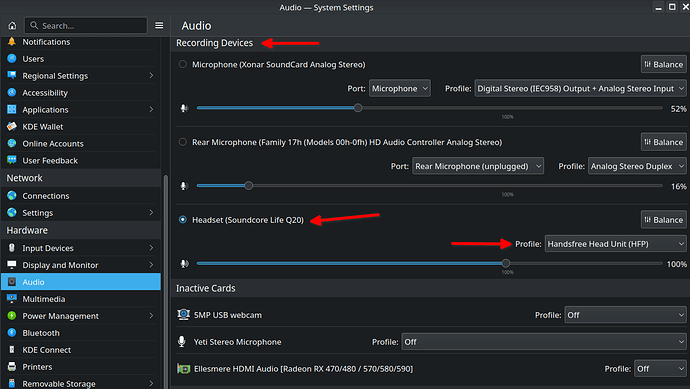My bluetooth headset, Anker Soundcore Life Q20, was initially able to connect to my desktop PC and was shown as an output device. However, it wasn’t showing the headset’s microphone as an input device.
After a couple of days, the headset stopped showing up altogether as an output device when I was trying to get the mic to show up as an input device. It connects fine to bluetooth, and can be seen in command line as well, but Pulseaudio Volume Control does not pick it up. It does not show up as a sound card also. Please see outputs below:
Output of inxi -Fazy:
inxi -Fazy
System:
Kernel: 5.9.3-1-MANJARO x86_64 bits: 64 compiler: gcc v: 10.2.0
parameters: BOOT_IMAGE=/boot/vmlinuz-5.9-x86_64
root=UUID=a28f0365-a23a-468a-9a56-c1cb0d59bf23 rw
resume=UUID=78d1f68f-ba2b-4b62-81ae-218be41a930a
amdgpu.ppfeaturemask=0xffffffff
bootsplash.bootfile=bootsplash-themes/amd/bootsplash
Desktop: KDE Plasma 5.20.2 tk: Qt 5.15.1 info: latte-dock wm: kwin_x11
dm: SDDM Distro: Manjaro Linux
Machine:
Type: Desktop Mobo: ASRock model: B450 Pro4 serial: <filter>
UEFI: American Megatrends v: P3.40 date: 07/02/2019
Battery:
Device-1: hidpp_battery_0 model: Logitech K520 serial: <filter>
charge: 70% (should be ignored) rechargeable: yes status: Discharging
Device-2: hidpp_battery_1 model: Logitech Wireless Mouse M325
serial: <filter> charge: 55% (should be ignored) rechargeable: yes
status: Discharging
CPU:
Info: 6-Core model: AMD Ryzen 5 2600 bits: 64 type: MT MCP arch: Zen+
family: 17 (23) model-id: 8 stepping: 2 microcode: 800820D
L2 cache: 3072 KiB
flags: avx avx2 lm nx pae sse sse2 sse3 sse4_1 sse4_2 sse4a ssse3 svm
bogomips: 98250
Speed: 3351 MHz min/max: 1550/4100 MHz boost: enabled Core speeds (MHz):
1: 3351 2: 2795 3: 3203 4: 2536 5: 1631 6: 3344 7: 3911 8: 2642 9: 3499
10: 2746 11: 1620 12: 2882
Vulnerabilities: Type: itlb_multihit status: Not affected
Type: l1tf status: Not affected
Type: mds status: Not affected
Type: meltdown status: Not affected
Type: spec_store_bypass
mitigation: Speculative Store Bypass disabled via prctl and seccomp
Type: spectre_v1
mitigation: usercopy/swapgs barriers and __user pointer sanitization
Type: spectre_v2 mitigation: Full AMD retpoline, IBPB: conditional, STIBP:
disabled, RSB filling
Type: srbds status: Not affected
Type: tsx_async_abort status: Not affected
Graphics:
Device-1: AMD Ellesmere [Radeon RX 470/480/570/570X/580/580X/590]
vendor: Gigabyte driver: amdgpu v: kernel bus ID: 09:00.0 chip ID: 1002:67df
Display: x11 server: X.Org 1.20.9 compositor: kwin_x11 driver: amdgpu
FAILED: ati unloaded: modesetting alternate: fbdev,vesa display ID: :0
screens: 1
Screen-1: 0 s-res: 1920x1080 s-dpi: 96 s-size: 508x285mm (20.0x11.2")
s-diag: 582mm (22.9")
Monitor-1: HDMI-A-0 res: 1920x1080 hz: 75 dpi: 82
size: 598x336mm (23.5x13.2") diag: 686mm (27")
OpenGL: renderer: Radeon RX 570 Series (POLARIS10 DRM 3.39.0 5.9.3-1-MANJARO
LLVM 10.0.1)
v: 4.6 Mesa 20.2.1 direct render: Yes
Audio:
Device-1: AMD Ellesmere HDMI Audio [Radeon RX 470/480 / 570/580/590]
vendor: Gigabyte driver: snd_hda_intel v: kernel bus ID: 09:00.1
chip ID: 1002:aaf0
Device-2: AMD Family 17h HD Audio vendor: ASRock driver: snd_hda_intel
v: kernel bus ID: 0b:00.3 chip ID: 1022:1457
Device-3: Logitech HD Webcam C525 type: USB driver: snd-usb-audio,uvcvideo
bus ID: 1-7:2 chip ID: 046d:0826 serial: <filter>
Device-4: ASUSTek Xonar SoundCard type: USB
driver: hid-generic,snd-usb-audio,usbhid bus ID: 3-1:2 chip ID: 0b05:189d
Device-5: Blue Microphones Yeti Stereo Microphone type: USB
driver: hid-generic,snd-usb-audio,usbhid bus ID: 1-10:3 chip ID: b58e:9e84
serial: <filter>
Sound Server: ALSA v: k5.9.3-1-MANJARO
Network:
Device-1: Realtek RTL8111/8168/8411 PCI Express Gigabit Ethernet
vendor: ASRock driver: r8168 v: 8.048.03-NAPI modules: r8169 port: d000
bus ID: 08:00.0 chip ID: 10ec:8168
IF: enp8s0 state: up speed: 1000 Mbps duplex: full mac: <filter>
IF-ID-1: wgpia0 state: unknown speed: N/A duplex: N/A mac: N/A
Drives:
Local Storage: total: 8.19 TiB used: 2.35 TiB (28.7%)
SMART Message: Unable to run smartctl. Root privileges required.
ID-1: /dev/sda vendor: SanDisk model: SDSSDH3 1T00 size: 931.51 GiB
block size: physical: 512 B logical: 512 B speed: 6.0 Gb/s serial: <filter>
rev: 00RL scheme: GPT
ID-2: /dev/sdb vendor: Seagate model: ST8000VN004-2M2101 size: 7.28 TiB
block size: physical: 4096 B logical: 512 B speed: 6.0 Gb/s
rotation: 7200 rpm serial: <filter> rev: SC60 scheme: GPT
Partition:
ID-1: / raw size: 100.00 GiB size: 98.18 GiB (98.18%)
used: 24.58 GiB (25.0%) fs: ext4 dev: /dev/sda1
ID-2: /home raw size: 828.29 GiB size: 814.29 GiB (98.31%)
used: 70.80 GiB (8.7%) fs: ext4 dev: /dev/sda3
Swap:
Kernel: swappiness: 1 (default 60) cache pressure: 50 (default 100)
ID-1: swap-1 type: partition size: 2.93 GiB used: 0 KiB (0.0%) priority: -2
dev: /dev/sda2
Sensors:
System Temperatures: cpu: 48.4 C mobo: 37.0 C gpu: amdgpu temp: 40.0 C
Fan Speeds (RPM): fan-1: 1006 fan-2: 932 fan-3: 932 fan-4: 709 fan-5: 992
gpu: amdgpu fan: 2100
Power: 12v: N/A 5v: N/A 3.3v: 3.31 vbat: 3.26 gpu: amdgpu watts: 33.12
Info:
Processes: 338 Uptime: 10h 20m Memory: 15.63 GiB used: 4.30 GiB (27.5%)
Init: systemd v: 246 Compilers: gcc: 10.2.0 Packages: pacman: 1636 lib: 428
Shell: Bash v: 5.0.18 running in: konsole inxi: 3.1.08
Output of pactl list cards:
pactl list cards
Card #0
Name: alsa_card.usb-Blue_Microphones_Yeti_Stereo_Microphone_REV8-00
Driver: module-alsa-card.c
Owner Module: 6
Properties:
alsa.card = "4"
alsa.card_name = "Yeti Stereo Microphone"
alsa.long_card_name = "Blue Microphones Yeti Stereo Microphone at usb-0000:01:00.0-10, full speed"
alsa.driver_name = "snd_usb_audio"
device.bus_path = "pci-0000:01:00.0-usb-0:10:1.0"
sysfs.path = "/devices/pci0000:00/0000:00:01.3/0000:01:00.0/usb1/1-10/1-10:1.0/sound/card4"
udev.id = "usb-Blue_Microphones_Yeti_Stereo_Microphone_REV8-00"
device.bus = "usb"
device.vendor.id = "b58e"
device.vendor.name = "Blue Microphones"
device.product.id = "9e84"
device.product.name = "Yeti Stereo Microphone"
device.serial = "Blue_Microphones_Yeti_Stereo_Microphone_REV8"
device.form_factor = "microphone"
device.string = "4"
device.description = "Yeti Stereo Microphone"
module-udev-detect.discovered = "1"
device.icon_name = "audio-input-microphone-usb"
Profiles:
input:analog-stereo: Analog Stereo Input (sinks: 0, sources: 1, priority: 65, available: yes)
input:iec958-stereo: Digital Stereo (IEC958) Input (sinks: 0, sources: 1, priority: 55, available: yes)
output:analog-stereo: Analog Stereo Output (sinks: 1, sources: 0, priority: 6500, available: yes)
output:analog-stereo+input:analog-stereo: Analog Stereo Duplex (sinks: 1, sources: 1, priority: 6565, available: yes)
output:analog-stereo+input:iec958-stereo: Analog Stereo Output + Digital Stereo (IEC958) Input (sinks: 1, sources: 1, priority: 6555, available: yes)
output:iec958-stereo: Digital Stereo (IEC958) Output (sinks: 1, sources: 0, priority: 5500, available: yes)
output:iec958-stereo+input:analog-stereo: Digital Stereo (IEC958) Output + Analog Stereo Input (sinks: 1, sources: 1, priority: 5565, available: yes)
output:iec958-stereo+input:iec958-stereo: Digital Stereo Duplex (IEC958) (sinks: 1, sources: 1, priority: 5555, available: yes)
off: Off (sinks: 0, sources: 0, priority: 0, available: yes)
Active Profile: output:iec958-stereo+input:analog-stereo
Ports:
analog-input-mic: Microphone (type: Mic, priority: 8700, latency offset: 0 usec)
Properties:
device.icon_name = "audio-input-microphone"
Part of profile(s): input:analog-stereo, output:analog-stereo+input:analog-stereo, output:iec958-stereo+input:analog-stereo
iec958-stereo-input: Digital Input (S/PDIF) (type: SPDIF, priority: 0, latency offset: 0 usec)
Part of profile(s): input:iec958-stereo, output:analog-stereo+input:iec958-stereo, output:iec958-stereo+input:iec958-stereo
analog-output-speaker: Speakers (type: Speaker, priority: 10000, latency offset: 0 usec)
Properties:
device.icon_name = "audio-speakers"
Part of profile(s): output:analog-stereo, output:analog-stereo+input:analog-stereo, output:analog-stereo+input:iec958-stereo
iec958-stereo-output: Digital Output (S/PDIF) (type: SPDIF, priority: 0, latency offset: 0 usec)
Part of profile(s): output:iec958-stereo, output:iec958-stereo+input:analog-stereo, output:iec958-stereo+input:iec958-stereo
Card #1
Name: alsa_card.usb-046d_HD_Webcam_C525_F17129E0-00
Driver: module-alsa-card.c
Owner Module: 7
Properties:
alsa.card = "3"
alsa.card_name = "HD Webcam C525"
alsa.long_card_name = "HD Webcam C525 at usb-0000:01:00.0-7, high speed"
alsa.driver_name = "snd_usb_audio"
device.bus_path = "pci-0000:01:00.0-usb-0:7:1.0"
sysfs.path = "/devices/pci0000:00/0000:00:01.3/0000:01:00.0/usb1/1-7/1-7:1.0/sound/card3"
udev.id = "usb-046d_HD_Webcam_C525_F17129E0-00"
device.bus = "usb"
device.vendor.id = "046d"
device.vendor.name = "Logitech, Inc."
device.product.id = "0826"
device.product.name = "HD Webcam C525"
device.serial = "046d_HD_Webcam_C525_F17129E0"
device.form_factor = "webcam"
device.string = "3"
device.description = "HD Webcam C525"
module-udev-detect.discovered = "1"
device.icon_name = "camera-web-usb"
Profiles:
input:mono-fallback: Mono Input (sinks: 0, sources: 1, priority: 1, available: yes)
input:multichannel-input: Multichannel Input (sinks: 0, sources: 1, priority: 1, available: yes)
off: Off (sinks: 0, sources: 0, priority: 0, available: yes)
Active Profile: off
Ports:
analog-input-mic: Microphone (type: Mic, priority: 8700, latency offset: 0 usec)
Properties:
device.icon_name = "audio-input-microphone"
Part of profile(s): input:mono-fallback
multichannel-input: Multichannel Input (type: Line, priority: 0, latency offset: 0 usec)
Part of profile(s): input:multichannel-input
Card #2
Name: alsa_card.pci-0000_09_00.1
Driver: module-alsa-card.c
Owner Module: 8
Properties:
alsa.card = "0"
alsa.card_name = "HDA ATI HDMI"
alsa.long_card_name = "HDA ATI HDMI at 0xfcf60000 irq 77"
alsa.driver_name = "snd_hda_intel"
device.bus_path = "pci-0000:09:00.1"
sysfs.path = "/devices/pci0000:00/0000:00:03.1/0000:09:00.1/sound/card0"
device.bus = "pci"
device.vendor.id = "1002"
device.vendor.name = "Advanced Micro Devices, Inc. [AMD/ATI]"
device.product.id = "aaf0"
device.product.name = "Ellesmere HDMI Audio [Radeon RX 470/480 / 570/580/590]"
device.string = "0"
device.description = "Ellesmere HDMI Audio [Radeon RX 470/480 / 570/580/590]"
module-udev-detect.discovered = "1"
device.icon_name = "audio-card-pci"
Profiles:
output:hdmi-stereo: Digital Stereo (HDMI) Output (sinks: 1, sources: 0, priority: 5900, available: no)
output:hdmi-surround: Digital Surround 5.1 (HDMI) Output (sinks: 1, sources: 0, priority: 800, available: no)
output:hdmi-surround71: Digital Surround 7.1 (HDMI) Output (sinks: 1, sources: 0, priority: 800, available: no)
output:hdmi-stereo-extra1: Digital Stereo (HDMI 2) Output (sinks: 1, sources: 0, priority: 5700, available: no)
output:hdmi-surround-extra1: Digital Surround 5.1 (HDMI 2) Output (sinks: 1, sources: 0, priority: 600, available: no)
output:hdmi-surround71-extra1: Digital Surround 7.1 (HDMI 2) Output (sinks: 1, sources: 0, priority: 600, available: no)
output:hdmi-stereo-extra2: Digital Stereo (HDMI 3) Output (sinks: 1, sources: 0, priority: 5700, available: no)
output:hdmi-surround-extra2: Digital Surround 5.1 (HDMI 3) Output (sinks: 1, sources: 0, priority: 600, available: no)
output:hdmi-surround71-extra2: Digital Surround 7.1 (HDMI 3) Output (sinks: 1, sources: 0, priority: 600, available: no)
output:hdmi-stereo-extra3: Digital Stereo (HDMI 4) Output (sinks: 1, sources: 0, priority: 5700, available: no)
output:hdmi-surround-extra3: Digital Surround 5.1 (HDMI 4) Output (sinks: 1, sources: 0, priority: 600, available: no)
output:hdmi-surround71-extra3: Digital Surround 7.1 (HDMI 4) Output (sinks: 1, sources: 0, priority: 600, available: no)
output:hdmi-stereo-extra4: Digital Stereo (HDMI 5) Output (sinks: 1, sources: 0, priority: 5700, available: no)
output:hdmi-surround-extra4: Digital Surround 5.1 (HDMI 5) Output (sinks: 1, sources: 0, priority: 600, available: no)
output:hdmi-surround71-extra4: Digital Surround 7.1 (HDMI 5) Output (sinks: 1, sources: 0, priority: 600, available: no)
output:hdmi-stereo-extra5: Digital Stereo (HDMI 6) Output (sinks: 1, sources: 0, priority: 5700, available: no)
output:hdmi-surround-extra5: Digital Surround 5.1 (HDMI 6) Output (sinks: 1, sources: 0, priority: 600, available: no)
output:hdmi-surround71-extra5: Digital Surround 7.1 (HDMI 6) Output (sinks: 1, sources: 0, priority: 600, available: no)
off: Off (sinks: 0, sources: 0, priority: 0, available: yes)
Active Profile: off
Ports:
hdmi-output-0: HDMI / DisplayPort (type: HDMI, priority: 5900, latency offset: 0 usec, availability group: Legacy 1, not available)
Properties:
device.icon_name = "video-display"
Part of profile(s): output:hdmi-stereo, output:hdmi-surround, output:hdmi-surround71
hdmi-output-1: HDMI / DisplayPort 2 (type: HDMI, priority: 5800, latency offset: 0 usec, availability group: Legacy 2, not available)
Properties:
device.icon_name = "video-display"
Part of profile(s): output:hdmi-stereo-extra1, output:hdmi-surround-extra1, output:hdmi-surround71-extra1
hdmi-output-2: HDMI / DisplayPort 3 (type: HDMI, priority: 5700, latency offset: 0 usec, availability group: Legacy 3, not available)
Properties:
device.icon_name = "video-display"
Part of profile(s): output:hdmi-stereo-extra2, output:hdmi-surround-extra2, output:hdmi-surround71-extra2
hdmi-output-3: HDMI / DisplayPort 4 (type: HDMI, priority: 5600, latency offset: 0 usec, availability group: Legacy 4, not available)
Properties:
device.icon_name = "video-display"
Part of profile(s): output:hdmi-stereo-extra3, output:hdmi-surround-extra3, output:hdmi-surround71-extra3
hdmi-output-4: HDMI / DisplayPort 5 (type: HDMI, priority: 5500, latency offset: 0 usec, availability group: Legacy 5, not available)
Properties:
device.icon_name = "video-display"
Part of profile(s): output:hdmi-stereo-extra4, output:hdmi-surround-extra4, output:hdmi-surround71-extra4
hdmi-output-5: HDMI / DisplayPort 6 (type: HDMI, priority: 5400, latency offset: 0 usec, availability group: Legacy 6, not available)
Properties:
device.icon_name = "video-display"
Part of profile(s): output:hdmi-stereo-extra5, output:hdmi-surround-extra5, output:hdmi-surround71-extra5
Card #3
Name: alsa_card.pci-0000_0b_00.3
Driver: module-alsa-card.c
Owner Module: 9
Properties:
alsa.card = "1"
alsa.card_name = "HD-Audio Generic"
alsa.long_card_name = "HD-Audio Generic at 0xfce00000 irq 79"
alsa.driver_name = "snd_hda_intel"
device.bus_path = "pci-0000:0b:00.3"
sysfs.path = "/devices/pci0000:00/0000:00:08.1/0000:0b:00.3/sound/card1"
device.bus = "pci"
device.vendor.id = "1022"
device.vendor.name = "Advanced Micro Devices, Inc. [AMD]"
device.product.id = "1457"
device.product.name = "Family 17h (Models 00h-0fh) HD Audio Controller"
device.string = "1"
device.description = "Family 17h (Models 00h-0fh) HD Audio Controller"
module-udev-detect.discovered = "1"
device.icon_name = "audio-card-pci"
Profiles:
input:analog-stereo: Analog Stereo Input (sinks: 0, sources: 1, priority: 65, available: no)
output:analog-stereo: Analog Stereo Output (sinks: 1, sources: 0, priority: 6500, available: no)
output:analog-stereo+input:analog-stereo: Analog Stereo Duplex (sinks: 1, sources: 1, priority: 6565, available: no)
off: Off (sinks: 0, sources: 0, priority: 0, available: yes)
Active Profile: off
Ports:
analog-input-front-mic: Front Microphone (type: Mic, priority: 8500, latency offset: 0 usec, availability group: Legacy 1, not available)
Properties:
device.icon_name = "audio-input-microphone"
Part of profile(s): input:analog-stereo, output:analog-stereo+input:analog-stereo
analog-input-rear-mic: Rear Microphone (type: Mic, priority: 8200, latency offset: 0 usec, availability group: Legacy 2, not available)
Properties:
device.icon_name = "audio-input-microphone"
Part of profile(s): input:analog-stereo, output:analog-stereo+input:analog-stereo
analog-input-linein: Line In (type: Line, priority: 8100, latency offset: 0 usec, availability group: Legacy 3, not available)
Part of profile(s): input:analog-stereo, output:analog-stereo+input:analog-stereo
analog-output-lineout: Line Out (type: Line, priority: 9000, latency offset: 0 usec, availability group: Legacy 4, not available)
Part of profile(s): output:analog-stereo, output:analog-stereo+input:analog-stereo
analog-output-headphones: Headphones (type: Headphones, priority: 9900, latency offset: 0 usec, availability group: Legacy 5, not available)
Properties:
device.icon_name = "audio-headphones"
Part of profile(s): output:analog-stereo, output:analog-stereo+input:analog-stereo
Card #4
Name: alsa_card.usb-ASUSTeK_Xonar_SoundCard-00
Driver: module-alsa-card.c
Owner Module: 27
Properties:
alsa.card = "2"
alsa.card_name = "Xonar SoundCard"
alsa.long_card_name = "ASUSTeK Xonar SoundCard at usb-0000:04:00.0-1, high speed"
alsa.driver_name = "snd_usb_audio"
device.bus_path = "pci-0000:04:00.0-usb-0:1:1.0"
sysfs.path = "/devices/pci0000:00/0000:00:01.3/0000:01:00.2/0000:02:01.0/0000:04:00.0/usb3/3-1/3-1:1.0/sound/card2"
udev.id = "usb-ASUSTeK_Xonar_SoundCard-00"
device.bus = "usb"
device.vendor.id = "0b05"
device.vendor.name = "ASUSTek Computer, Inc."
device.product.id = "189d"
device.product.name = "Xonar SoundCard"
device.serial = "ASUSTeK_Xonar_SoundCard"
device.string = "2"
device.description = "Xonar SoundCard"
module-udev-detect.discovered = "1"
device.icon_name = "audio-card-usb"
Profiles:
input:analog-stereo: Analog Stereo Input (sinks: 0, sources: 1, priority: 65, available: yes)
output:analog-stereo: Analog Stereo Output (sinks: 1, sources: 0, priority: 6500, available: yes)
output:analog-stereo+input:analog-stereo: Analog Stereo Duplex (sinks: 1, sources: 1, priority: 6565, available: yes)
output:analog-surround-21: Analog Surround 2.1 Output (sinks: 1, sources: 0, priority: 1300, available: yes)
output:analog-surround-21+input:analog-stereo: Analog Surround 2.1 Output + Analog Stereo Input (sinks: 1, sources: 1, priority: 1365, available: yes)
output:analog-surround-40: Analog Surround 4.0 Output (sinks: 1, sources: 0, priority: 1200, available: yes)
output:analog-surround-40+input:analog-stereo: Analog Surround 4.0 Output + Analog Stereo Input (sinks: 1, sources: 1, priority: 1265, available: yes)
output:analog-surround-41: Analog Surround 4.1 Output (sinks: 1, sources: 0, priority: 1300, available: yes)
output:analog-surround-41+input:analog-stereo: Analog Surround 4.1 Output + Analog Stereo Input (sinks: 1, sources: 1, priority: 1365, available: yes)
output:analog-surround-50: Analog Surround 5.0 Output (sinks: 1, sources: 0, priority: 1200, available: yes)
output:analog-surround-50+input:analog-stereo: Analog Surround 5.0 Output + Analog Stereo Input (sinks: 1, sources: 1, priority: 1265, available: yes)
output:analog-surround-51: Analog Surround 5.1 Output (sinks: 1, sources: 0, priority: 1300, available: yes)
output:analog-surround-51+input:analog-stereo: Analog Surround 5.1 Output + Analog Stereo Input (sinks: 1, sources: 1, priority: 1365, available: yes)
output:iec958-stereo: Digital Stereo (IEC958) Output (sinks: 1, sources: 0, priority: 5500, available: yes)
output:iec958-stereo+input:analog-stereo: Digital Stereo (IEC958) Output + Analog Stereo Input (sinks: 1, sources: 1, priority: 5565, available: yes)
off: Off (sinks: 0, sources: 0, priority: 0, available: yes)
Active Profile: output:analog-surround-51
Ports:
analog-input-mic: Microphone (type: Mic, priority: 8700, latency offset: 0 usec, availability group: Legacy 1, available)
Properties:
device.icon_name = "audio-input-microphone"
Part of profile(s): input:analog-stereo, output:analog-stereo+input:analog-stereo, output:analog-surround-21+input:analog-stereo, output:analog-surround-40+input:analog-stereo, output:analog-surround-41+input:analog-stereo, output:analog-surround-50+input:analog-stereo, output:analog-surround-51+input:analog-stereo, output:iec958-stereo+input:analog-stereo
analog-input-linein: Line In (type: Line, priority: 8100, latency offset: 0 usec, availability group: Legacy 2, available)
Part of profile(s): input:analog-stereo, output:analog-stereo+input:analog-stereo, output:analog-surround-21+input:analog-stereo, output:analog-surround-40+input:analog-stereo, output:analog-surround-41+input:analog-stereo, output:analog-surround-50+input:analog-stereo, output:analog-surround-51+input:analog-stereo, output:iec958-stereo+input:analog-stereo
analog-output-speaker: Speakers (type: Speaker, priority: 10000, latency offset: 0 usec, availability group: Legacy 3, available)
Properties:
device.icon_name = "audio-speakers"
Part of profile(s): output:analog-stereo, output:analog-stereo+input:analog-stereo, output:analog-surround-21, output:analog-surround-21+input:analog-stereo, output:analog-surround-40, output:analog-surround-40+input:analog-stereo, output:analog-surround-41, output:analog-surround-41+input:analog-stereo, output:analog-surround-50, output:analog-surround-50+input:analog-stereo, output:analog-surround-51, output:analog-surround-51+input:analog-stereo
analog-output-headphones: Headphones (type: Headphones, priority: 9900, latency offset: 0 usec, availability group: Legacy 4, not available)
Properties:
device.icon_name = "audio-headphones"
Part of profile(s): output:analog-stereo, output:analog-stereo+input:analog-stereo
iec958-stereo-output: Digital Output (S/PDIF) (type: SPDIF, priority: 0, latency offset: 0 usec)
Part of profile(s): output:iec958-stereo, output:iec958-stereo+input:analog-stereo
Output of info in bluetoothctl:
[Soundcore Life Q20]# info
Device 88:D0:39:A7:50:2A (public)
Name: Soundcore Life Q20
Alias: Soundcore Life Q20
Class: 0x00240404
Icon: audio-card
Paired: yes
Trusted: yes
Blocked: no
Connected: yes
LegacyPairing: no
UUID: Audio Sink (0000110b-0000-1000-8000-00805f9b34fb)
UUID: A/V Remote Control Target (0000110c-0000-1000-8000-00805f9b34fb)
UUID: Advanced Audio Distribu.. (0000110d-0000-1000-8000-00805f9b34fb)
UUID: A/V Remote Control (0000110e-0000-1000-8000-00805f9b34fb)
UUID: Handsfree (0000111e-0000-1000-8000-00805f9b34fb)
These are the bluetooth-related packages currently installed (sorry, can’t post pics yet):
Bluetooth (blueberry)
gnome-bluetooth
manjaro-bluetooth
pulseaudio-bluetooth
bluez
bluez-hid2hci
bluez-libs
bluez-utils
I tried to get the headset to show up by following the tutorial called “[HowTo] Bluetooth headphones paired, but no sound after a while” from Manjaro forum but it did not work. Sorry, can’t post links yet.
Could someone please help me get the headset to show up again, and be able to work as a headset (with mic input)? Thank you in advance.


